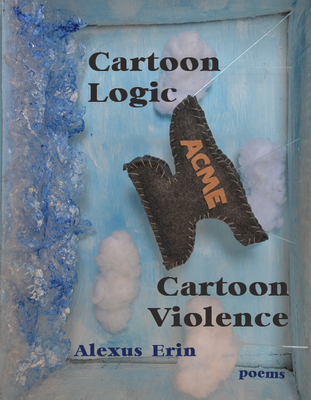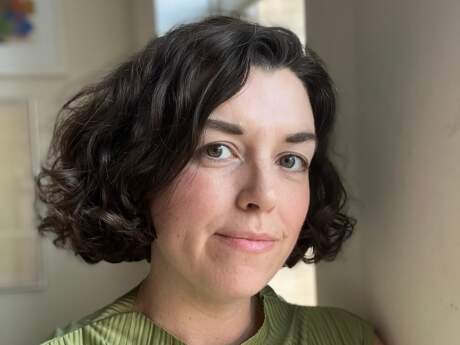In Their Own Words
Alexus Erin on “It’s a Love Poem”

It's a Love Poem
I know
That centrifugal force, blooming in wind
and ink in napkins,
frizz and garlic salt
The jokes about me have a thimble
Of truth: I did see God
at the height of all four seasons
Shimmering, like fine craft glitter, on the other side
of a chain link fence
Surely, I wasn’t the only one
The boys of my youth taught me to climb
and hop
in case we had to outrun the cops
into a kind of freedom
that had no end.
I’m trying to tell you
It may be an exaggeration to claim
that I have never been in love like this
but I am
painting a coastline, a silhouette,
like its contours are
the neck
of my hometown
and I am closing in from the waters,
swimming.
From Cartoon Logic, Cartoon Violence (Baobab Press, 2022). All rights reserved. Reprinted with the permission of the author.
On “It’s a Love Poem”
I mostly wrote “It’s a Love Poem” while watching a film, prefiguring through poetry about a love I loved (a man who, after our first date, I laughed directly into the sky about; I seemed to be having a profound experience of pronoia. Everything felt fortuitous, but inevitable. Magical. In an expression of bizarre and rapturous relief, I did a pirouette, followed by a full split on the floor in the lobby of the building he dropped me off at when we parted for the evening). The film was the 1998 fantasy romantic comedy Practical Magic, starring Sandra Bullock and Nicole Kidman. It was, specifically, the scene where Sandra Bullock’s character, Sally—a young witch in a family of witches, cursed with the inability to experience true and lasting love—is powered by a spell from her witchier aunts, and suddenly walking with great purpose to a man also touched by their spell. It’s funny how we write words through “spelling”. Never mind. As Sally walks directly down the main road, a dog scurries across her path. Faith Hill’s “This Kiss” plays in the background. The word “centrifugal” may be familiar to you here (it actually meant the opposite of what I thought when I wrote it in the poem.). The spell remains intact, tragedy befalls them, and the love is lost.
It wasn’t until I was editing the manuscript for Cartoon Logic, Cartoon Violence (in which the poem appears), years later, that I realized I hadn’t been writing a happy love poem at all.
The poem was correct, of course. It was, as poems are, an odd, mathematical truism; two sides stating their peace on either side of an equal sign. It was a word problem. It retells this joke about me: that in every poem I write, the “I” of the poem sees God. Or, I see God, and that’s how the poem gets made. The poem says something about a painting I painted (which my mom later told me to find a frame for or be rid of it. I got rid of it); the vanishing point was a never-arriving horizon.
It was and wasn’t a love poem. I had to wait to see.
In Infinite Thought Alain Badiou regards poetry, not unlike mathematics, as a truth procedure directed away from “chance”, which is derived from a preconceived, therein limited, set of possibilities. This truth procedure moves toward a “point of interruption” that disrupts preconception. The poem, itself, spoke in a confluence of the past and open unknown. There was the symbolic and the real, the prophetical and the phenomenon, the first and second draft— there is the Word and then there is God. Known Word and an unknowable God who knows all (and the Word is with God and the Word is God and God who is Word was incarnated and died and lives). It hinted at home; it hints at odyssey. The poem made its bold claim, then said nothing of endurance to make it real (it, in fact, said everything about the endurance it takes to make it real.)
I’m going to spoil the end of the movie now:
The man bewitched by the aunts was never Sally’s soulmate. Instead, her future was meant to be with a love she’d casted a spell for (against?), in the past, as a child. He was a man so unbelievable she was sure he’d never arrive. If he never arrived, he’d never be lost; the curse would never befall her (again) (—wait, did it ever actually?). Of course: it did, and it didn’t. The not-yet-determined comes to be and the math adds up. The curse is finally undone, and just in time.
Don’t swap God for time here, if you can help it.



